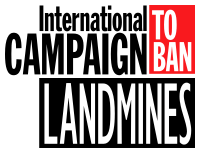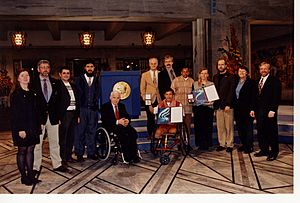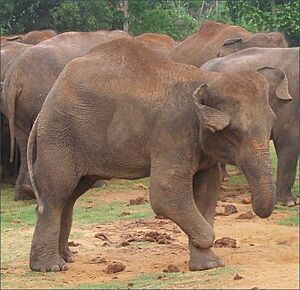International Campaign to Ban Landmines facts for kids
 |
|
| Abbreviation | ICBL |
|---|---|
| Formation | October 1992 |
| Founder | Jody Williams |
| Founded at | New York, United States |
| Type | NGO |
| Legal status | Nonprofit |
| Purpose | Working for a world free of antipersonnel landmines and cluster munitions |
| Headquarters | Geneva, Switzerland |
|
Region
|
Worldwide |
| Methods | Public awareness, publications and advocating at national, regional and international levels |
| Fields | Disarmament of anti-personnel mines |
| Website | www.icbl.org |

The International Campaign to Ban Landmines (ICBL) is a group of non-governmental organizations (NGOs). Their main goal is to create a world free of dangerous weapons like anti-personnel mines and cluster munitions. They also work to make sure that people who have survived these weapons get the help they need. This way, survivors can live full and happy lives.
The ICBL started in 1992. Six organizations with similar goals decided to work together. These included groups from France, Germany, the UK, and the US. Since then, the campaign has grown a lot. It now has active members in about 100 countries. These members include groups focused on children, veterans, human rights, and peace. A famous supporter of the campaign was Diana, Princess of Wales.
The ICBL and its first coordinator, Jody Williams, won the 1997 Nobel Peace Prize. They received this award for their hard work to create the Mine Ban Treaty. This treaty bans the use, making, storing, and moving of anti-personnel mines. Signing this treaty is seen as the campaign's biggest success. Rae McGrath, a co-founder, and Tunn Channareth, a Cambodian mine survivor, accepted the prize for the organization.
The ICBL keeps an eye on the global situation with mines and cluster munitions. They do this through their research group, Landmine and Cluster Munition Monitor. They also work to get more countries to join the Mine Ban Treaty. The ICBL supports programs that help communities affected by mines. They also help landmine survivors and their families. The campaign works to stop the production and use of landmines by everyone, including armed groups. They also raise public awareness about the dangers of mines.
How the ICBL Works
In 2011, the International Campaign to Ban Landmines (ICBL) joined with the Cluster Munition Coalition (CMC). They formed one group called the ICBL-CMC. This merger helped them work more efficiently. Both the ICBL and CMC campaigns still exist separately. They continue to remind governments about their promises to follow and promote both treaties. Landmine and Cluster Munition Monitor keeps doing its important work. It checks on the effects of landmines and cluster munitions.
A special board helps guide the ICBL-CMC's activities. This board helps with planning, money, and staff. An Advisory Committee also gives regular advice to the staff. Four ambassadors represent the campaign at events worldwide. These include Jody Williams and three landmine survivors: Tun Channareth, Song Kosal, and Margaret Arech Orech. The ICBL currently has 14 staff members. They work in offices in Geneva, Lyon, Paris, and Ottawa. Many interns also join the ICBL-CMC each year.
The Mine Ban Treaty
The Mine Ban Treaty is an international agreement that bans anti-personnel mines. Its full name is The Convention on the Prohibition, Use, Stockpiling, Production and Transfer of Antipersonnel Mines and on Their Destruction. People sometimes call it the Ottawa Convention. This treaty was agreed upon in Oslo, Norway, in September 1997. Then, 122 countries signed it in Ottawa, Canada, on December 3, 1997. As of March 2018, 164 countries had joined the Ottawa Treaty.
The Mine Ban Treaty asks member countries to do several things:
- Agree not to use, make, store, or move anti-personnel mines.
- Destroy all the mines they have stored within four years.
- Clear all areas in their country that have mines within 10 years.
- In countries affected by mines, teach people about the dangers of mines. They must also make sure mine survivors and their families get full support.
- Offer help to other countries that are part of the treaty. This could be by helping survivors or clearing mines.
- Create national laws to make sure the treaty's rules are followed in their country.
Landmine and Cluster Munition Monitor
Landmine and Cluster Munition Monitor is the research part of the ICBL-CMC. It acts as the main group checking on the Mine Ban Treaty. It also monitors the Convention on Cluster Munitions from 2008. This group watches and reports on how countries are following these treaties. It also looks at the problems caused by landmines and other explosive war remains. The Monitor was the first time NGOs worked together in a planned way to check on humanitarian laws. They regularly record progress and problems. This shows that groups outside of government can help make sure treaties are followed.
Since it started in 1998, the Monitor's research has been done by a global network of researchers. Most of these researchers are ICBL-CMC campaigners in different countries. All their work is carefully checked by the Monitor's Editorial Team before it is published.
See also
 In Spanish: Campaña Internacional para la Prohibición de las Minas Antipersona para niños
In Spanish: Campaña Internacional para la Prohibición de las Minas Antipersona para niños
- Mines Advisory Group
- Geneva Call, an NGO that focuses on non-state actors
- Swiss Foundation for Mine Action
- Mine clearance agencies
- Demining
- Land mine
- Anti-personnel mine
- Aki Ra, an anti-mining activist
- Ban Advocates Voice from communities affected by cluster munitions
- Manitoba Campaign to Ban Landmines
- International Coalition to Ban Uranium Weapons
 | Madam C. J. Walker |
 | Janet Emerson Bashen |
 | Annie Turnbo Malone |
 | Maggie L. Walker |


